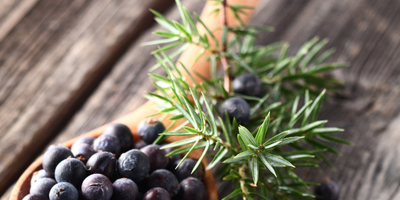Growing up in Flanders, juniper berries were a familiar sight, especially when it came to making jenever, a traditional Flemish gin. Jenever, named after the Dutch word for juniper (“jeneverbes”), has been cherished in our region for centuries. This spirit is my personal connection to the past, a sip of history that carries the stories and traditions of those who came before us.
Historically, jenever was distilled as a medicinal tonic, believed to aid digestion, relieve joint pain, and ward off a variety of ailments, thanks to the potent properties of juniper berries. Over time, it evolved into a beloved drink, sipped slowly to appreciate its aromatic, piney flavour – a perfect companion for a chilly evening by the fire.
Botanical marvel
Common juniper is a hardy evergreen shrub that thrives in rocky, well-drained soils across Europe It belongs to the cypress family and is known for its resilience, often found in challenging environments where other plants struggle to survive. Juniper bushes are typically low-lying, with needle-like leaves and small, berry-like cones that are green when young and take about two to three years to ripen to a deep blue or purple.
These berries are a slow-maturing wonder of nature, reminding us of the virtues of patience and resilience. Their maturation process, stretched over several seasons, is a testament to the plant’s hardiness and its ability to thrive in tough conditions. This slow growth allows the berries to develop a rich concentration of aromatic oils, which are responsible for their distinctive flavour and medicinal properties.
The mystical side of Juniper
Juniper berries are steeped in folklore and magic. For centuries, people have believed in the protective powers of juniper. In many cultures, juniper was thought to ward off evil spirits, witches, and even the plague. It was common practice to hang bundles of juniper above doorways or burn its branches as incense to cleanse a space and protect against negative energies.
In my childhood, I often heard stories of families using juniper to protect their homes from misfortune. The sharp scent of burning juniper branches was believed to purify the air, driving away illness and malevolent forces. In the Scottish Highlands, juniper smoke was used in purification rituals, a practice that felt like something out of a fairy tale but was rooted in a deep belief in the natural world’s power to heal and protect.
Medicinal marvels
Juniper berries have long been valued for their medicinal properties. They are known for their detoxifying effects, particularly their ability to support the kidneys and urinary tract. The berries act as a diuretic, helping to flush out toxins and reduce bloating, making them a popular choice in herbal remedies for kidney and bladder health.
Juniper berries are also praised for their digestive benefits. They stimulate the production of digestive enzymes, which can help soothe the stomach, reduce gas, and alleviate indigestion. This makes them a great addition to herbal blends designed to support digestive health. The antimicrobial and anti-inflammatory properties of juniper berries further enhance their reputation as a versatile and powerful natural remedy. They are also often used in soothing baths for those with aching joints and muscles.
Foraging for Juniper berries
If you’re fortunate enough to live in an area where juniper grows wild, foraging for these berries can be a delightful autumn activity. You’ll often find juniper bushes in dry, rocky areas, where they are surrounded by the rugged beauty of nature. The best time to harvest the berries is in late summer to early autumn when they have turned a rich blue or purple, indicating they are fully ripe.
When foraging, it’s important to harvest responsibly. Juniper berries play a crucial role in the ecosystem, providing food for birds and other wildlife. Always take only what you need, and leave plenty behind to ensure that the juniper population remains healthy and vibrant. This mindful approach to foraging not only preserves the environment but also honours the tradition of sustainable harvesting that has been passed down through generations.
Making medicine
Now, let’s bring some of this magic into the kitchen with a delicious juniper berry syrup recipe! This syrup combines the warming spices of cinnamon and ginger, creating a perfect blend for cosy autumn days. Not only is it tasty, but it also allows you to enjoy the medicinal benefits of juniper berries in a delightful, easy-to-make form.
Warming Juniper berry syrup
- Ingredients:
- ½ cup of juniper berries
- ½ cup of dried ginger
- ¼ cup of cinnamon
- 2 cups of water
- 1 cup of honey
- Method:
- Start by bringing 2 cups of water to a boil in a medium-sized pan.
- Add the juniper berries, dried ginger, and cinnamon to the boiling water. Reduce the heat, cover, and let it simmer gently for about 30 minutes. This will create a strong decoction, extracting all the beneficial compounds and flavours from the ingredients.
- After simmering, strain the mixture through a fine strainer lined with a muslin cloth to remove the solid ingredients. Let the liquid cool down just a bit until it’s warm but not hot.
- Stir in one cup of honey while the infusion is still warm. The honey will dissolve more easily when the liquid is warm, and it will help preserve the syrup naturally.
- Pour your finished syrup into a sterilised jar or bottle and store it in the refrigerator. The syrup should keep for several months, allowing you to enjoy its flavours and benefits over time.
Juniper berry syrup is incredibly versatile. Drizzle it over pancakes or yoghurt for a sweet, spicy kick, or mix it into warm water or tea for a comforting drink that supports digestion and overall wellbeing. You can even use it in cocktails for a unique, herbal twist – imagine a juniper-infused hot toddy on a cold winter night! Yum!
